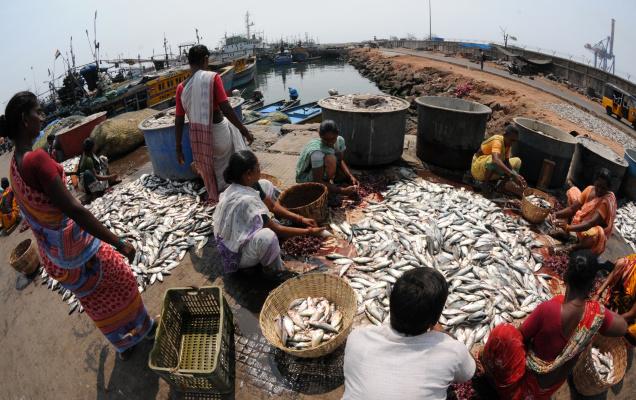
In the midst of all the negativism that has become the order of the day a visit to the rural areas in Andhra Pradesh can be an inspiring experience. Recently, I visited the fisherwomen community, who have organised themselves into a federation called Godavari Mahasamakhya in East Godavari district. I expected a meeting with a group of noisy, bustling women, the kind I used to frequently interact with in the coastal areas during my days in Ongole and Nellore 30 years back.
What I saw was a stunning transformation. Fisherwomen, wearing a blue sari uniform, neatly combed hair and giving Power Point presentations on the various activities under implementation by their organisation!
Starting from 2005, 20,150 fisherwomen of 72 villages have been so far organised into 1,744 self help groups (SHG) as a part of the State’s Indira Kranthi Padhakam programme. An SHG typically consists of 10 women. All the SHGs then join to form a village organisation (VOs) where decisions are taken on their lending policies, repayment systems, etc. Representatives of the VOs then confederate into Mandal Samakhya (consisting of about 20 villages), which then send their representatives to constitute the district level Samakhya. In this case, the fisherwomen organised their own apex body.
The entry point for forming groups is mutual lending — taking loans to address their various needs and prompt repayment. This activity has not only enriched them in the process but also released them from the clutches of money lenders who have had a vice like grip on the fisher folk community, keeping them in perpetual poverty.
A woman described how they lived their life on chance — the daily yield and sale of fish would determine their evening meal. Most often, money lenders would lie in wait for the boat to grab the fish in repayment of their loan. Children did not go to school, had no clothes. From then, she now has apucca house, owns five to 10 acres of land, one son studying to be a doctor, another an engineer and she is busy learning Hindi to train women of the northern States on SHG organisation.
The women contribute, save and borrow from the banks to lend for a portfolio of activities. They levy their own rates of interest. Currently, their project value is about Rs. 48 crore, with higher savings than borrowings. Their repayment rate is 97 per cent. Besides, economic activities have been taken up where over 7,000 women have helped their husbands set up electrical shops, carpentry units, buy land, etc.; they also have their own self-funded activities such as each member contributing two kg of rice every month for giving five kg to the most vulnerable among them; providing pension of Rs. 200 and if the pensioner dies, providing Rs. 3,000 for the funeral; pooling Re. 1 per month for helping someone in dire condition; providing scholarships to their children studying professional courses.
What I have seen is really revolutionary. But at the other end was also clearly visible the ugly face of capitalist exploitation. A retail chain giant has destroyed the livelihood of the fishermen in four villages that I visited and in return given them a marriage hall belying all the promises of skill building, alternate employment, etc. While fishermen sit idling on the platform that not long ago was a bustling scene of marketing fish, I wondered why and how governments repeatedly renege on their commitment towards inclusive development. For the billions of rupees that the country and the retail giant are getting from the gas, how much would it have cost them to rehabilitate those few families on inland fisheries and developing fish ponds? Clearly sharing is something that the rich and the educated have to learn from these women who may be illiterate and poor but certainly have better values of care and concern.
(The writer is former Secretary, Union Ministry of Health & Family Welfare)
source: http://www.thehindu.com / The Hindu / Home> News> National> Andhra Pradesh / by K Sujatha Rao / July 30th, 2013